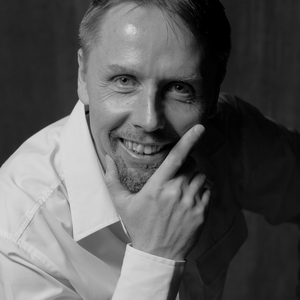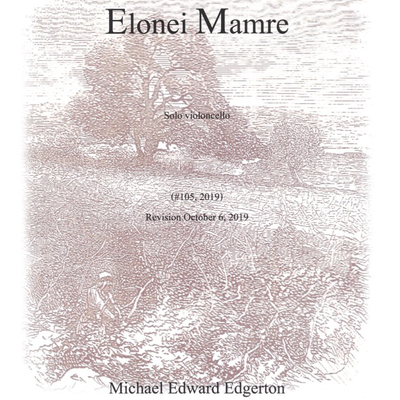Michael Edward Edgerton is an active composer with performances around the world. His compositions have received international prizes and recognition. Michael’s music coalesces diverse influences such as European avant-garde, American experimentalism, and world music into contexts that are often informed by scientific models and metaphors. In works such as Rust, this Tattoo of Hunters’ Boots and Rifle Bolts he attempts to convey an expression similar to Edward Said’s notion of an artwork exhibiting “intransigence, difficulty, and unresolved contradiction” in order to provide an “occasion to stir up more anxiety, tamper irrevocably with the possibility of closure and leave the audience more perplexed than before… to explore…a nonharmonious, non-serene tension, and above all, a sort of deliberately unproductive productiveness, going ‘against’…” While the methods and systems he develops are often influenced by science, it is his intuition – his ear that gives birth to the music.
Michael Edgerton is at the forefront of vocal exploration and has influenced an entire generation through his book, The 21st Century Voice (Rowman & Littlefield, 2nd edition, 2015). As composer, researcher and performer, he has presented new developments in the search for the technical and expressive limits of voice. In addition to research on voice, Michael has published scholarly articles on the intersections of multidimensional networks and nonlinear dynamics on music composition.
His works have been performed around the world by ensembles including 441 Hz Chamber Choir, AuditivVokal Dresden, Bremer Schlagzeugensemble, C Asean Consonant Ensemble, Ekmeles Ensemble, Ensemble Ars Nova, Ensemble L’Itinéraire, Ensemble Proxima Centauri, Ensemble Vortex, Gageego, Kairos String Quartet, Kammerkoret Aurum, Loadbang, Stockholm Saxophone Quartet, Quartet New Generation, Works-in-Progress Ensemble; and by soloists Pavlos Antoniadis, Matthias Bauer, Jeffrey Burns, Éric-Maria Couturier (Ensemble Intercontemporain), Moritz Ernst, Andreas Fröhling, Mauricio Galeano, Rada Hadjikostova, Jan Heinke, Liu Hu, Joshua Hyde, Chatschatur Kanajan, Timo Kinnunen, Almut Kühne, Jonas Larsson, Jack Adler-Mckean, Mats Möller, Theo Nabicht, Stefan Östersjö, Angela Rademacher-Wingerath, Gary Verkade, among others.
Michael is currently working as Professor of Music at Lund University/the Malmö Academy of Music where he directs the Artistic Research Program in Music.
Born in Racine, Wisconsin
From 1980, composition studies with A. Wegner, F. Mueller, J. Hutcheson, W. Brooks and M. Powell
Graduated with B.A. in vocal performance from the University of Wisconsin-Parkside in 1984; M.M. in music composition from Michigan State University in 1987; D.M.A. in music composition from the University of Illinois in Urbana in 1994. Worked as Postdoctoral Fellow from 1996 to 1999 at the University of Wisconsin in Madison
Recent performances of his own compositions European Grand Prix for Choral Singing 54th Tolosa Choral Contest, Darmstadt Internationales Musikinstitut Ferienkurse, Fake Voices – vom falschen Bewusstsein at Deutsches Hygiene-Museum in Dresden, Lund at SNU (Seoul National University), Goethe Institut in Hanoi and Ho Chi Minh City, SLUB Dresden Verehrungsklänge 15 Jahre AuditivVokal Jubiläumskonzert, Lund Contemporary in Palaestra et Odeum, Göttinger Abende Zeitgenössischer Musik, Bremen Torhaus, Doctors in Performance in Tallinn, The 21st Century Guitar at the Universidade NOVA de Lisboa, Tehran International Electronic Music Festival, Unerhörte Musik im BKA Theater, Let the Peoples Sing in Barcelona, Musicacoustica Festival Beijing, etc.
His works have been performed around the world by ensembles including 441 Hz Chamber Choir, AuditivVokal Dresden, Bremer Schlagzeugensemble, C Asean Consonant Ensemble, Ekmeles Ensemble, Ensemble Ars Nova, Ensemble L’Itinéraire, Ensemble Proxima Centauri, Ensemble Vortex, Gageego, Guangxi Symphony Orchestra, Kairos String Quartet, Kammerkoret Aurum, Loadbang, Seoul National University New Music Ensemble, Stockholm Saxophone Quartet, Quartet New Generation, UC Berkeley Chamber Chorus, VocalX Choir, Works-in-Progress Ensemble, Za’ba Voices (Malaysia); and by soloists Pavlos ANTONIADIS, Matthias BAUER, Jeffrey BURNS, Éric-Maria COUTURIER (Ensemble Intercontemporain), Moritz ERNST, Andreas FRÖHLING, Mauricio GALEANO, Rada HADJIKOSTOVA, Jan HEINKE, LIU Hu, Joshua HYDE, Chatschatur KANAJAN, KIM Sujin, Timo KINNUNEN, Almut KÜHNE, Jonas LARSSON, Jack ADLER-MCKEAN, Mats MÖLLER, Theo NABICHT, Stefan ÖSTERSJÖ, Angela RADEMACHER-WINGERATH, Gary VERKADE, Argenta WALTHER, among others.
Recipient of numerous prizes and recognition for composition including 2016 5th China-Asean Composition Competition (1st Excellent Award), 2007 Kompositionspreis der Landeshauptstadt Stuttgart, 1996 MacDowell Club (First Prize), 1989 Midwest Composers Symposium (Selection), 1987 National Federation of Music Clubs (Third Prize), 1986 Michigan State University-Orchestral Composition Contest (First Prize).
COMPOSITION Michael’s music coalesces diverse influences such as European avant-garde, American experimentalism, and world music into contexts that are informed by scientific models and metaphors. While the methods and systems he develops are often influenced by science, it is his intuition – his ear that gives birth to the music. Significant compositions? Admittedly subjective but here goes… ENSEMBLE #109 RUST this tattoo of hunters’ boots and rifle bolts (sinfonietta), #106 Der Rufer (perc qt), #89 The Return of Takhi, the Last Feral Horse (b cl, trpt, trbn, voice), #77 A Marriage of Shadows (fl, sax, perc, gtr, vce), #64 String Quartet #1 (str qt), #22 Regret of a Noiseless Sundering (sax qt), #9 Unspoken Crime (vln, vlc, pno); SOLO #105 Elonei Mamre (vlc), #91 THRUSH (pno), #72 Tempo Mental Rap (gtr), #70 1 sonata (pno); VOICE #110 VineLand (solo vce, lo-fi audio recording, 3D images), #101 Sirene Segmenti (sop solo w choir), #88 abaGa baʁatur (SATB), #82 Cataphora (solo vce); ELECTRONIC #53 Wassermann (2 channel playback); OPERA #11 Hour History (4 actors, 11 male vcs, perc ensemble).
RESEARCH Michael has published scholarly articles on music composition, the extra-normal voice, multidimensional scaling in sound production, and and nonlinear phenomenon. Significant publications BOOK 2014 The 21st Century Voice (2nd ed, Rowman & Littlefield); ARTICLES 2023 Short Report of Extreme Voices (Röstläget), 2021 A Report on influences from superfluid turbulence in Der Rufer (Art and Science: ISTE OpenScience), 2021 From Second Sound to Music (Cold Facts), 2019 The Extra-Normal Voice in The Oxford Handbook of Singing (Oxford University Press), 2014 A case study of scaling multiple parameters by the violin (Musicae Scientiae), 2013 Pitch profile of the Glottal Whistle (Malaysian Journal of Science), 2012 Notational Practice of Complex Music (Revista Música Hodie, Goiânia), 2008 Zappa Speaks Again in New Music and Aesthetics in the 21st Century (Wolke Verlag), 2004 Non-Linear Phenomena in Contemporary Vocal Music (Journal of Voice), 1999 Multiple Sound Sources of the Vocal Tract (National Center for Voice and Speech Status and Progress Report), 1999 Palatal Sound: A Comprehensive Model of Vocal Tract Articulation (Organized Sound), 1999 The Throat Singers of Tuva (Scientific American)
His music is recorded 2023 Michael Edgerton works for piano played by Moritz Ernst (Perfect Noise), 2015 Modern Choral Masterpieces by 441 Hz Chamber Choir (Dux Records), 2014 The 21st Century Voice – Audio Excerpts (Rowman & Littlefield), 2012 Raven, Le Corbeau from Frederique Bruyas & Mike Edgerton (Escargot ma non troppo, Paris) 2012 Alles – Auβer – Gewöhnlich (Auditivvokal Dresden), 2001 Electronic Voices (Galerie SPHN, Berlin)
His compositions and research have lots of mentions in articles and books, here are some recent ones: 2023 Weisend wrote A Popular History of Superfluid Helium, 2021 Maia wrote Developing a vigilant musical practice (PhD thesis, Bath Spa University), 2019 Kohl wrote Getting to the Core: About Meredith Monks Facing North and the Art of the Natural Voice (European Journal of Musicology), 2016 Barabási wrote Network Science (Cambridge University Press), 2016 Zatorski wrote Extended Vocal Techniques: Anaphora: An Interprative Analysis (Honours Thesis, The Elder Conservatorium of Music. Adelaide: The University of Adelaide), 2015 Havrøy wrote Alone Together: Vocal ensemble practice seen through the lens of Neue Vocalsolisten Stuttgart (Ph.D. Dissertation. Norwegian Academy of Music),
VOICE. Edgerton is a specialist of the extra-normal voice as composer, researcher, pedagogue and performer. Voice composition: Edgerton has written numerous compositions involving normal and extra-normal voice. Voice Research: Under the supervision of Diane Bless, Edgerton began the formal study of voice science which has led to the publication of articles and his book, The 21st Century Voice as part of the New Instrumentation Series. Voice pedagogue: Edgerton sometimes trains singers, focusing on methods of extra-normal voice production that extend western avant-garde (anti)traditions, which are influenced from an experimental attitude, nonwestern music and informed by systematic explorative methods. Voice performer: Since 2000, Edgerton has worked more in freely, improvised contexts. Edgerton has improvised with Mathias Bauer, Frédérique Bruyas, Axel Dörner, Fern Chern Hwei, Andrés Galeano, Goh Lee-Kwong, Johan van Kreij, Romain Mercier, Izumi Ose, Hugues Vincent, Yong Yandsen, Etienne Ziemniak.
In 2012, Edgerton’s work as composer, performer and pedagogue of voice was included in the film “Stimmig – 10 Vokalexkursionen” by Giovanazzi. The film is a documentary about the variety of human vocal expression: Yodeling, overtone singing, buccal speech, laughter yoga, extra-normal voice, esophageal speech, beatboxing and animal voice imitation. Also, an excerpt of Edgerton’s composition “Anaphora” is shown.
Since 2019, Professor of Music at Lund University/the Malmö Academy of Music where he directs the Artistic Research Program in Music.

Michael Edward EDGERTON
Composer
Member since
March 27, 2024
 About
About
 Works
Works
Elonei Mamre
 1
1
 0
0

